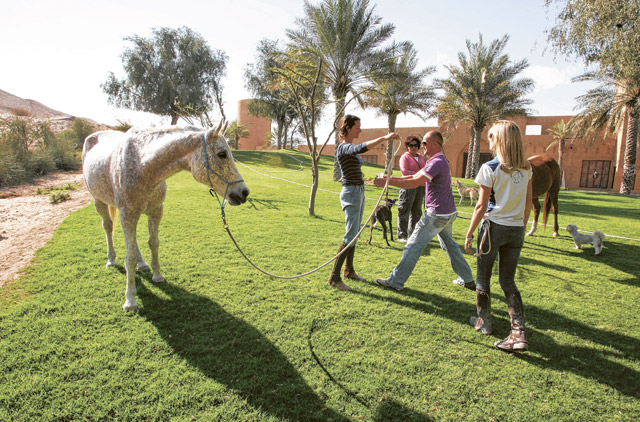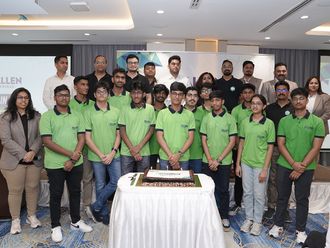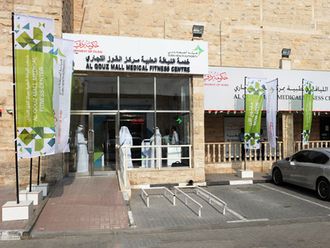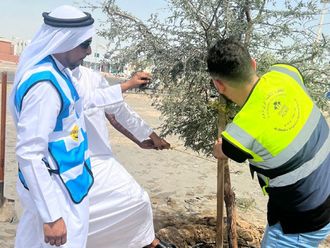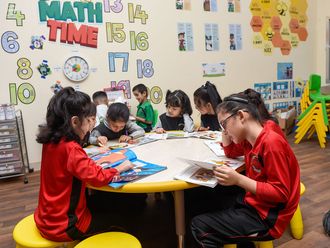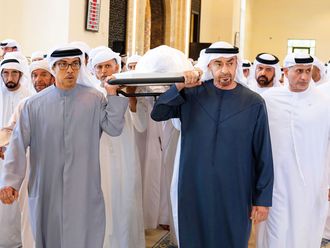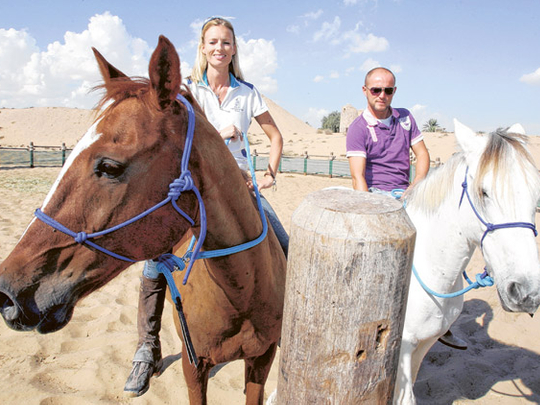
Dubai: A place where horses roam free, camels are part of the family, donkeys graze lazily and where a pack of dogs adopts an orphan goat…. No, this isn't an outback farm, or a ranch in the Wild West. This scenario is a daily occurrence at Dubai's first American-style ranch headed by Briton Carrie Tindel.
Seven months of preparation and round-the-clock hours later, the Desert Ranch opened its doors on October 1 last year. Since then it's turned into a thriving hub of Arabian heritage and natural horsemanship. It's a place where the animals roam free and students are taught about the psychology of the animal they ride, or "horsinality" as Tindel calls it, from the ground up, before even setting foot in the stirrup.
While equestrian centres have sprung up all over the UAE, a ranch concept is still new to many. "The idea is to create a community around animals and to offer education on how an animal functions mentally, before teaching a person how to interact with the animal physically," says Tindel, General Manager of the ranch.
Inseparable pack
The ranch's animal community also includes a very special member: Fudge, the orphan goat. When Fudge's mother died after childbirth, the assumption was that one of the other goats on the ranch would mother her. Little did Tindel realise that it was her pack of dogs that would be up to the task instead.
As Tindel speaks, a pack of five dogs, including one honorary member, comes dashing into the room. In the midst of the four jumping dogs is Fudge, trying to wag her tail and be like her brothers and sisters. "There's a unique bond between Fudge and the dogs. She believes she's one of them. Often, when the dogs have gone chasing something, and Fudge hasn't been able to keep up, she's heard bleating and crying, calling for them to return to her," says Tindel, who hasn't the heart to put her back with the goats. "If she's a dog at heart, then that's what we'll encourage," she says.
The concept of a ranch environment in Dubai stemmed from a KHDA (Knowledge and Human Development Authority) report about schools scoring low on social and heritage related activities. "It was clear there wasn't much opportunity for children to have hands-on experiences with local activities such as animal husbandry, rearing and milking of camels, which were once very popular with the Bedouins," says Tindel.
As a result, Tindel created the Desert Gecko Group, a weekly morning programme where children spend three hours learning about animals, feeding, cleaning, riding and understanding their motivation and behaviour.
Equine therapy
Desert Ranch also offers corporate training where blue collar executives are exposed to challenging situations to allow them to feel and experience their emotions out of their comfort zone.
"The horse acts as a mirror to what a human being is feeling on an emotional level. As humans, we tend to mask our emotions through the use of language. We may be hurt, but when asked will say everything's alright. The horses are used as a tool to help people understand themselves and their styles of leadership."
In this unusual therapy, executives are put in a pen of horses. The only rule is that they can't make the first move. The human waits for the horse to approach them, ensuring that the animal that resonates most closely with the vibrations of that person gets to team up. "The sessions also include challenges and tasks for people to conquer with their horse, making them bond and ultimately create a style of leadership that's unique to them," says Tindel.
Love and leadership
While most equestrian centres and riding schools teach traditional riding techniques, Desert Ranch aims to go au naturel with their methods. Mark Barsby, the Ranch Operations Manager, explains how students can benefit from learning traditional riding skills, combined with natural horsemanship techniques. "In Dubai there are no natural horsemanship teachers other than Carrie. Through this school of teaching, one learns to understand the language of the horse," says Barsby.
"It is less a horse training programme and more a method for teaching humans how to train horses using love, language and leadership," says Tindel.
Together they are everything a student would need when learning to work with horses. While Carrie teaches people to understand how to develop a relationship with horses, Barsby teaches the actual equitation.


